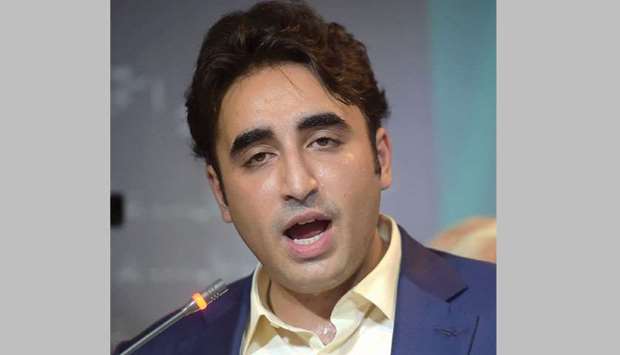The opposition parties said they had come to parliament despite rejecting the election results for the sake of democracy and parliament, but warned the newly-elected prime minister that they would continue their agitation within and without parliament if their demand is not met.
However, the Pakistan Peoples Party (PPP) announced that it would support Khan if he worked for the betterment of the people and the country.
Pakistan Muslim League – Nawaz (PML-N) president Shehbaz Sharif, who is likely to be the leader of the opposition in the National Assembly, delivered his speech amid uproar by members of the PTI, focusing on the allegations of rigging in last month’s polls.
He received a similar response from PTI legislators as his party’s members earlier staged a protest and did not allow Khan to smoothly address the house for the first time after becoming prime minister.
“Throughout the world, newspapers and outlets are raising accusations of rigging in the general elections,” Sharif said, adding that this was the worst election in the country’s history in terms of rigging and the authorities must act against those responsible.
“What kind of election was this?” he asked amidst loud chants echoing across the assembly hall.
He alleged that the Result Transmission System (RTS) had been forcefully shut down [on the night of July 25] so that presiding officers could not transfer the results of their polling stations promptly to the Election Commission of Pakistan (ECP).
“What kind of elections were these that the results were delayed for 48 hours?” he pointed out.
Alleging that 1.6mn votes were rejected, he questioned the discovery of ballot papers from gutters and streets across the country.
Sharif asked the ECP to submit a report before the house and said that there are clauses in the Elections Act 2017 that needed amendment so that no one could “rob” the sanctity of vote.
He warned that the opposition parties would take to the streets if the parliamentary commission was not formed.
Reminding Khan of one of his promises he had made in his first address to the nation after the July 25 polls, Sharif said: “Khan Sahib, you had said that if rigging in 2013 elections would be proven, Nawaz Sharif’s government should resign. We will not let you run from this. We will hold you accountable for stealing votes.”
Clarifying his party’s stance, he said: “We came here for the sake of democracy and to protect the democratic system. There had been movements in the past and we have always stood by this house.
“No matter what we do, we will not curse this parliament; we will not attack this parliament.”
The PML-N chief refused to conclude his speech in protest after his microphone was switched off by the speaker so that PPP chairman Bilawal Bhutto Zardari could also address the house.
The PPP chairman, in his maiden speech on the floor of the house, urged Khan to be the prime minister of the whole country and not a single political party.
“Now you are the prime minister of those you have called donkeys, goats, sheep and corpses,” he said.
In his speech in English, Bhutto Zardari said that his party would support the new prime minister if he worked for the betterment of the people and the country.
The 29-year-old criticised the two biggest parties for creating a ruckus in parliament.
In his speech he mentioned those who were killed in terror attacks in Peshawar and Quetta in the run-up to the July 25 polls.
Bhutto Zaradri said that the PPP had its reservations over both the pre- and post-poll procedures, but still decided to be a part of the house to support the fragile democracy.
“We would have been facing a constitutional crisis and we must assess what it cost for Khan Sahib to get here. We mainstreamed extremism, we compromised on our basic rights, we pitted one Pakistani against another,” he added.
Reminding Khan of his 100-day manifesto, the PPP chairman said: “Our (then) prime minister-elect has promised a 100-day roadmap. I want to see how he creates 10mn jobs and ends poverty.
“I would like to ask Khan Sahib – who said he would rather commit suicide than go to the International Monetary Fund and beg for alms – what his plan will be to deal with the economic crisis.”
Talking about the country’s foreign policy, he said: “It is hurtful that Pakistan, which has sacrificed so much in the fight against violent extremism, is seen as a part of the problem and not as part of the solution.”
He urged Khan to “end” the politics of criticism and blaming each other, adding: “As prime minister, I hope Imran Khan will drop the hateful rhetoric.
“If he continues to fan the flames of hatred, he will have to go through us and he will find us opposing him at every step of the way.
“If the (Khan) makes constitutional supremacy and human development his priorities, we will stand by his side.”

